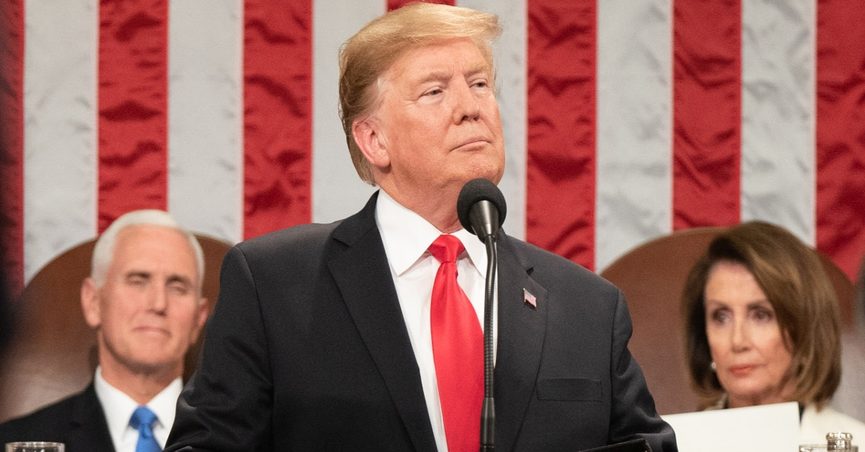The only conceivable path Donald Trump has to re-election next year is to continue to fire up faithful fans by invoking his dystopian view of a nation threatened by an immigrant horde determined to storm the southern border and wreck havoc on America. It is the one constant theme of his presidency and the overriding theme of his State of the Union speech this week, a speech laced with words like bloodthirsty, sadistic, venomous and chilling.
Trump has perfected the politics of resentment, fear and scapegoating that Republicans have been shoveling ever more aggressively toward their “base” since Barry Goldwater invoked “extremism in defense of liberty” more than fifty years ago.

That the image of the “lawless state of our southern border” is at odds with the facts hardly seemed to bother cheering Republicans in the House chamber Tuesday night. Republicans have largely embraced Trump’s resentment theory of politics, which is exemplified by his demonization of refugees and immigrants, while they have simultaneously tied the party’s future to Trump’s frayed coattails.
The overheated rhetoric about border threats, of course, also clashes with Trump’s claims about the strength of the American economy and his calls for unity, the issue that members of Idaho’s congressional delegation chose to emphasize in their reaction.
By general consensus of fact checkers the biggest whooper in Trump’s speech was his claim that a border wall built during the George W. Bush administration had reduced violent crime in El Paso, Texas. But, the actual statistics show that violent crime in El Paso – one of the safest larger cities in America – had actually plummeted before the barrier was constructed. Such twisting of reality helps explain why those who represent the border, Texas Republican Will Hurd for example, reject Trump’s wall as a waste of money, an ineffective simplistic symbolic fix for a complex problem.

While Trump did attempt the rhetoric of bipartisanship in the face of another looming government shutdown over funding the wall he offered no path out of the political dead end he himself has created. He avoided mention of the declaration of a national emergency, a tactic likely illegal and surely to be immediately challenged, but he left that explosive option on the table.
That Republicans actually tolerate talk of a declaration of national emergency over Trump’s failure to secure a policy objective that he could not accomplished when his party controlled Congress is Exhibit A in how completely the GOP has abandoned common sense, old fashioned conservatism and the Constitution. South Carolina Senator Lindsey Graham recently actually said Trump “must” invoke emergency powers to construct a border wall “if the White House and Congress fail to reach a deal.”
Idaho Senator Jim Risch also seems resigned to a Trump strategy that will include a national emergency. Risch predicted recently to KBOI radio’s Nate Shelman that the president’s Constitutional overreach was likely to happen, and apparently that is just fine with him.
“I think that the President has figured out that (House Speaker) Nancy (Pelosi) is not going to give the President a dime for the wall,” Risch said. “They hate this president so badly, that they won’t do anything for him, or give him anything that makes it look like a victory, so they are not going to vote for it. They’re happy with the shutdown.”
That is typical of Risch’s constant partisan gaslighting – the super partisan blaming others for partisanship – as well as his acquiescence to all things Trump and it begs the question conservative columnist George Will asked recently about Graham and could have asked about Risch.
“Why do they come to Congress, these people such as Graham,” Will wrote recently. “These people who, affirmatively or by their complicity of silence, trifle with our constitutional architecture, and exhort the president to eclipse the legislative branch, to which they have no loyalty comparable to their party allegiance?”
Once again history provides some perspective if we’re willing to understand what is at stake. In the early 1970s, in a true bipartisan effort, Senators Frank Church of Idaho, a Democrat, and Charles Mathias of Maryland, a Republican, worked for months to craft legislation – the National Emergencies Act – ensuring that Congress and not a president will define and supervise a true national emergency. The two senators co-chaired a Special Committee on the Termination of National Emergencies, determined to unwind generations of presidential emergency declarations dating back to the Great Depression. In their view such open-ended exercise of one-person power created vast opportunities for Constitutional overreach by the kind of president the nation now suffers. Their subsequent legislation passed overwhelmingly in the House and unanimously in the Senate.

Church and Mathias, apropos of the current moment, were, as constitutional scholar Gerald S. Dickinson wrote recently, “acutely aware of and sought to prohibit a future president from taking advantage of the emergency powers for partisan and policy purposes.”
In testimony before a Senate committee in 1976, Church said the president “should not be allowed to invoke emergency authorities or in any way utilize the provision of [the National Emergencies Act] for frivolous or partisan matters, nor for that matter in cases where important but not ‘essential’ problems are at stake.” He might have been talking about “the wall.”
Church, as his biographers note, believed containing a president’s ability to invoke a national emergency was one of the Idahoan’s proudest moments, an affirmation that Congress, armed with the Constitution, can and should stand against the overreach of a would be autocrat.
We shall see where all this is headed, but make no mistake Congress can halt the national emergency nonsense and doing so would be a profoundly “conservative,” not to mention Constitutional thing to do.
As for Risch and others like him in Congress don’t expect them to protect congressional prerogatives or stand up to a demagogue. When he recently became chairman of the Foreign Relations Committee, a position Church once held, he proudly proclaimed that he would be no Frank Church. On that much, at least, his is absolutely correct.
(Note: This piece originally appeared in the Lewiston (Idaho) Tribune.)
—-0—-
